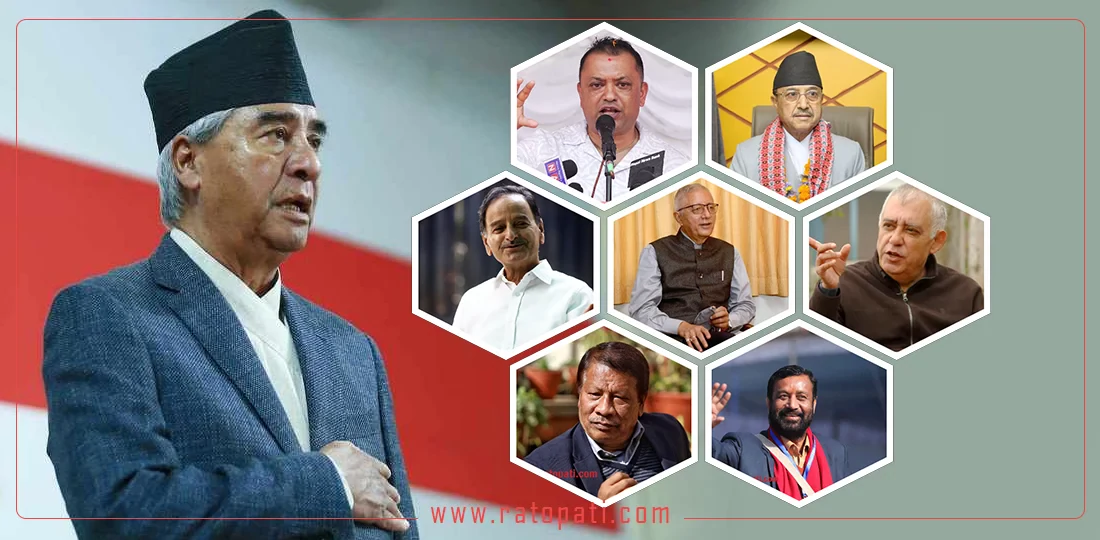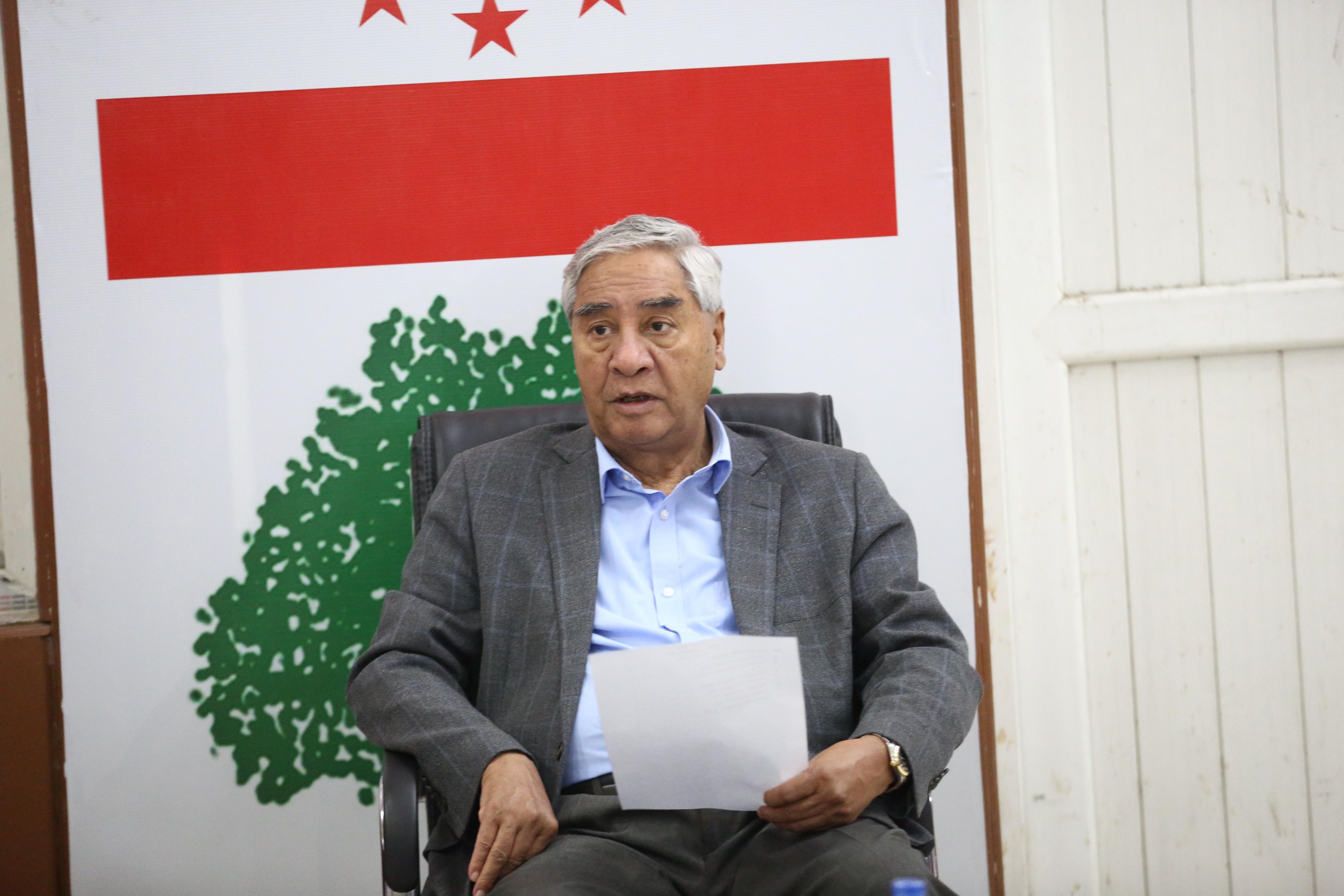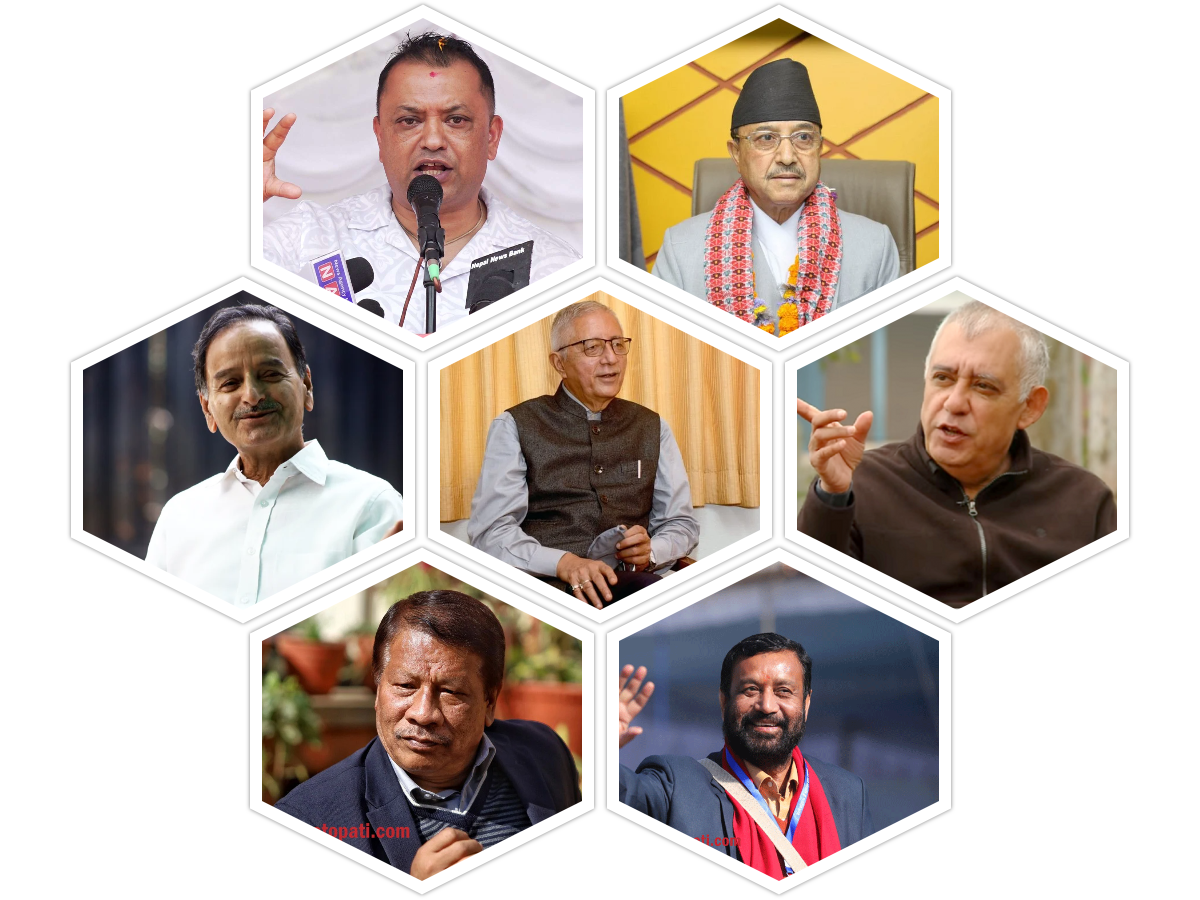Deuba's dilemma: A stream of leaders eager to succeed as Nepali Congress president

Kathmandu, September 27 — If the Nepali Congress holds its 15th General Convention on schedule, it will take place in December 2025. Based on the party statute, an additional year can been added, meaning the convention must happen by December 2026 under any circumstances. This convention will establish new leadership within the Congress.
Due to legal obligations, the 15th General Convention will mark the end of party politics for President Sher Bahadur Deuba. Deuba himself has acknowledged his "political retirement."
Analysts suggest that his statements indicate he is not interested in becoming president for a third term by amending the constitution.
On the other hand, there is a belief within Congress that Deuba will only hold the party convention after becoming Prime Minister. As the country's executive head, Deuba's departure from party politics will certainly enhance his value.
Central committee member Guru Baral states that Deuba's role in the 15th General Convention will be significant. He believes that those who have Deuba's sympathy will find it easier to gain leadership positions.
“Not just the old guard, but leaders who have positioned themselves among the new generation are also seeking his full support,” argues Baral, who is close to Deuba.
From being the first elected president of the Nepal Students' Union, Deuba has built a substantial political structure behind him. Coming from the mentorship of B.P. Koirala, he has steered the party away from "Koirala dynasties."
Having long fought to end dynastic politics within the party, Deuba has based his journey on this principle, even leading to party divisions.
Many leaders and activists support Deuba, who has served as Home Minister once and is awaiting his opportunity to become Prime Minister for the sixth time. There is a belief among leaders that winning the convention is only possible with the support of those following Deuba, whether partially or fully.
“It’s natural that leaders like Bimlendra Nidhi, Prakash Man Singh, Krishna Prasad Sitaula, Purna Bahadur Khadka, and Shanshak Koirala want Deuba’s backing. Meanwhile, leaders like Gagan Thapa are also trying to persuade Deuba as they race to become the presidengt,” says a leader from the opposing faction.

It is not a common occurrence for someone to become the executive head of the country multiple times. Deuba’s almost certain return to the position of Prime Minister for the sixth time—something his contemporaries have not achieved even once—marks a significant political success for him.
He is often praised by Congress members for surrounding himself with trustworthy allies and rewarding those who support him. Those loyal leaders and activists have consistently stood by Deuba, claiming he has settled their concerns in various ways.
According to political historian Rajesh Gautam, no other leader within the party has as strong a hold on the organization as Deuba does, regardless of the claims made from different angles. He believes there is no one within Congress capable of threatening Deuba’s leadership by asserting, “This will be his last term; he is weakening.”
Gautam notes that attempts by leaders like Nidhi and Sitaula, as well as the Koirala family and Gagan, to reach leadership positions are all similar in nature. “Without Deuba's blessing, there is no chance of becoming party president,” he asserts.
During the central committee meeting held in July, leaders requested Deuba to make them the party president. Even those who have had long-standing political rivalries with him are seeking his support for leadership. From the eastern region to the far west, many of Deuba’s close associates are hopeful of making a political leap under his guidance.
Senior journalist Kishor Nepal observes that Congress leaders are struggling to secure Deuba’s support. He suggests that Deuba is also facing a dilemma about whom to assist as he needs to leave a political legacy.
However, Nepal argues that Deuba has not taken any actions that would allow him to leave a legacy within Congress. “He has managed to unite people and factions. Even Shekhar hasn’t taken a hard stance against him,” Nepal points out. “It is natural for leaders to seek his support, but I don’t believe Deuba will emerge as the decisive force by the time of the convention.”
Are Deuba's preferences leaning towards the new or the old?
Many leaders are waiting for Deuba's blessing. Current Vice President Purna Bahadur Khadka believes that Deuba will elevate him to a position of official leadership.
According to one leader, Khadka has even received offers from both general secretaries to advance towards the presidency. Discussions about forming teams have occurred repeatedly.
Yet, he harbors some fear. “He doesn’t have many people around him. The general secretaries have encouraged him, but Khadka seems to think that Deuba will bless him,” the leader shared with Ratopati.
Additionally, leaders like Bimalendra Nidhi, Prakash Man Singh, and Shashank Koirala, who have benefitted from political legacies, are hopeful that Deuba will support them. Krishna Prasad Sitaula, who aimed for the presidency during the 13th convention, also holds expectations. Bijay Kumar Gachchhadar has declared his aspirations for leadership in the central committee meeting. Furthermore, Shekhar Koirala and General Secretary Gagan Thapa are also anticipating Deuba’s support, with reports suggesting that Thapa has been getting closer to Deuba lately.

"Within Congress, there is a prevailing strategy among leaders like Bimalendra to secure leadership positions by leveraging the Madhesh card, while Prakashman Singh is promoting himself using the legacy of Ganeshman. Additionally, there is an effort to advance Shashank, the son of B.P. Koirala, in the name of his father," analyst Nepal states.
Political analyst Shreekrishna Aniruddha Gautam argues that the quest for Deuba's blessing by leaders is a natural process due to the self-interests prevalent in politics.
"His grip within the party is quite strong. It is natural for any aspirant for the presidency to seek his support. They feel that gaining his blessing would make things easier," he says. "Somehow, his sympathy will play a role. However, it doesn't mean that just because Sher Bahadur says, 'my person' all the votes will automatically go to him."
With more than a year remaining until the convention, Deuba has not openly supported anyone so far. He has not given any hints of promoting anyone as his successor. Instead, he appears to be 'playing' among the leaders, assuring everyone, "I’m here; go ahead." As a result, Congress leaders are anxious, fearing that if they provoke Sher Bahadur, they will face repercussions, according to historian Rajesh Gautam.
"If they irritate Sher Bahadur, they know they might have to wash their hands of the incoming leadership," Gautam states. "Leaders within Congress fear that they could end up in the same situation as Bimalendra Nidhi, once considered Sher Bahadur’s second-in-command."
Currently, Deuba is also concerned about the political settlement of his wife, Arzu. She has been working to elevate her political standing since becoming the Foreign Minister. In addition, leaders like N.P. Saud, Ramesh Lekhak, Bir Bahadur Balayar, Prakash Sharan Mahat, and Gyanendra Bahadur Karki also require political settlements that Deuba needs to facilitate.
"Considering the political history of Congress and Arzu's recent initiatives, I don't believe she should be established in politics," analyst Rajesh Gautam concludes.










Leave Comment